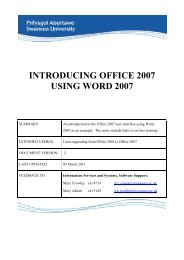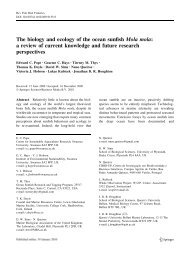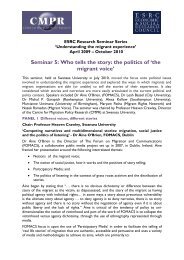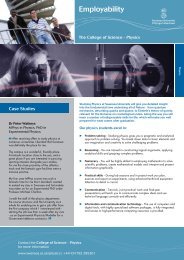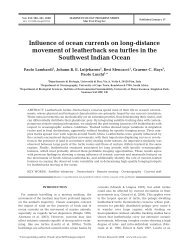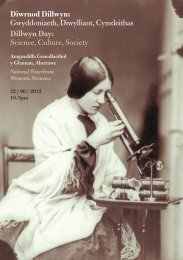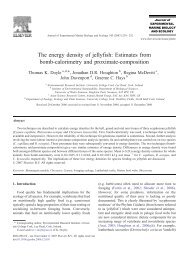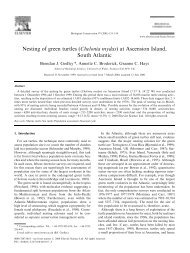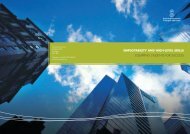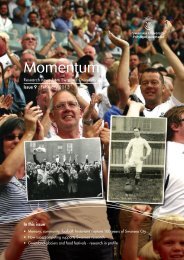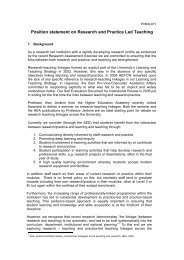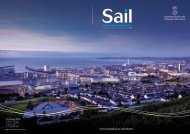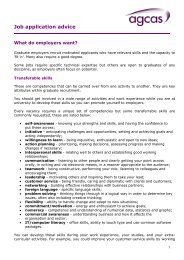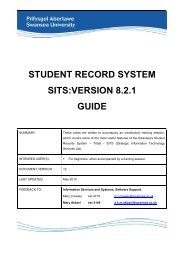ESRC seminar series summary - Swansea University
ESRC seminar series summary - Swansea University
ESRC seminar series summary - Swansea University
Create successful ePaper yourself
Turn your PDF publications into a flip-book with our unique Google optimized e-Paper software.
Understanding the migrant experience<br />
An <strong>ESRC</strong> Research Seminar Series, organised by the Centre for Migration<br />
Policy Research (CMPR) at <strong>Swansea</strong> <strong>University</strong>, April 2009 – October 2010<br />
Researchers at <strong>Swansea</strong> <strong>University</strong>’s Centre for Migration Policy Research (CMPR)<br />
have been awarded an <strong>ESRC</strong> grant to host a <strong>series</strong> of one-day <strong>seminar</strong>s which aim to<br />
increase understanding of the migrant experience. The idea for the <strong>series</strong> has arisen<br />
from a concern to ensure that the evidence on which policy making in the areas of<br />
asylum and migration is based includes evidence about the experiences of the principle<br />
actors in the migratory process; namely asylum seekers, refugees and migrants<br />
themselves, and the families and communities of which they are a part.<br />
Seminar aims<br />
The aim of this <strong>seminar</strong> <strong>series</strong> is to increase the current level of academic, policy and<br />
political interest in the experiences and voices of migrants and migrant communities. It<br />
aims to do so in a way that engages with - and is reflexive to - the complexity and<br />
variety of migrant experiences and engages directly with the political construction and<br />
reconstruction of migrant identities and voices (by academic, policy makers, public<br />
bodies, voluntary sector organisations and refugee and migrant groups themselves).<br />
Policy responses towards international migration can only be progressive and internally<br />
consistent if they reflect the drivers of migration flows and the needs, motivations,<br />
aspirations and voices of migrants themselves. While governments remain the primary<br />
actors in the production of migration policy, many other stakeholders including local<br />
authorities, the private sector, NGOs, civil society institutions and migrant associations<br />
are well placed to contribute to the formulation and implementation of migration policy.<br />
The engagement of these actors is especially needed to ensure the approach to<br />
migration is genuinely progressive, culturally sensitive, takes account of local<br />
specificities and recognises the importance of gender and other aspects of social<br />
difference.<br />
Although there is a growing (if still limited) interest among policy makers and other nonacademic<br />
users of research in the experiences of migrants (for example, in their<br />
motivations for coming to the UK or in their experiences of accessing public services), it<br />
is important that this interest does not translate into simplistic understandings of ‘the<br />
migrant experience’ or in forms of consultation or engagement with migrants which are<br />
regarded as superficial or tokenistic but are used to justify particular policy responses or<br />
approaches. Many migrants and their representative organisations do not feel that their<br />
views and experiences are genuinely taken into account in policy making and are<br />
concerned that the engagement that currently exists is limited to certain issues or areas<br />
of policy (for example, the integration of refugees). It is also important to recognise that<br />
the migrant voices presented in, or made available to, political and policy debates on<br />
immigration policy and practice reflect not only differences in methodological<br />
approaches to ‘capturing’ those voices - and in the extent to which certain voices are<br />
heard whilst others remain absent, but also the ways in which ‘the migrant experience’<br />
is politically and socially constructed to reflect and reinforce dominant paradigms and<br />
assumptions (for example, the migrant or refugee as oppressed and marginalised<br />
versus the migrant or refugee with rights).
Seminar themes<br />
The first theme running through the <strong>series</strong> is the theorisation of what might be termed<br />
‘the migrant experience’ and the questions of migrant agency and hybridity. Despite<br />
growing interest in the social dynamics of migration, the migrant experience remains<br />
relatively under-theorised. Reflecting this, a growing number of academics have begun<br />
to engage with the ways in which migrants' experiences are socially constructed and<br />
situated in particular political-economic and cultural contexts in meaningful ways. This<br />
literature suggests not only that the experiences of migrants will vary according to the<br />
citizenship policies and national ideologies of the receiving state and the strategies that<br />
immigrants formulate in response to their economic, cultural, and political position in the<br />
receiving society, but also according to the gender, age, ethnicity, religion and economic<br />
class (among other factors) of migrants themselves.<br />
A second theme running through the <strong>seminar</strong> <strong>series</strong> addresses the methodological<br />
approaches that are utilised to collect information about experiences of migration.<br />
Recent academic papers and conference reports have identified a number of<br />
problematic areas. These include: power relations in research, particularly where the<br />
migrants are in insecure legal situations or living in conditions of poverty; informing and<br />
gaining consent; issues of harm and safety for both researchers and research<br />
participants; the use and dissemination of research data; and ethical implications of<br />
research methodologies. These issues directly affect the ways in which experiences of<br />
migration are understood by academic and non-academic users of research and the<br />
wider communities of which migrants are a part.<br />
Finally the <strong>series</strong> will address the relationship between research intended to better<br />
understand ‘the migrant experience’ and the types and sources of ‘evidence’ that might<br />
be drawn upon in policy-making processes. Whilst there have been some efforts on the<br />
part of UK policy makers to engage with empirical evidence about the experiences of<br />
migrants, many of the immigration policies developed in the UK context continue to be<br />
based on assumptions about the motivations and aspirations of migrants and their<br />
families, or on economic and other empirical evidence about their ‘impacts’ on public<br />
services, community cohesion and race relations. The establishment of the Migrant<br />
Rights Network (MRN) in 2006 reflects a desire among migrants living in the UK to<br />
overcome their isolation from the policy making process, to share information and to<br />
increase their capacity and strategic abilities to effectively influence national policy on<br />
issues affecting them. But whether or not this possible will depend not only on the ability<br />
of migrant communities to articulate their interests, but also the relationship between<br />
those communities and the policy makers and practitioners whose decisions they seek<br />
to influence.
Seminar programme<br />
The proposed <strong>seminar</strong> <strong>series</strong> addresses some of these current debates through a<br />
programme of six one day events, each engaging with a different aspect of the migrant<br />
experience, and each consciously designed to bring together the users of research both<br />
within and beyond the academic community.<br />
Seminar 1 Is there a ‘migrant experience? (April 2009)<br />
This <strong>seminar</strong> will explore the concept of ‘the migrant experience’ from a theoretical<br />
perspective. The aim of this <strong>seminar</strong> is to explore the links between micro-level<br />
understanding of ‘the migrant experience’ and macro-level theories and trends. Interdisciplinary<br />
approaches will also be explored.<br />
Seminar 2 Understanding difference; the role of gender, age, class and race in<br />
shaping ‘the migrant experience’ (July 2009)<br />
This <strong>seminar</strong> will explore the ways in which different identities and roles shape the<br />
experience of migration including in relation to the decision to migrate and experiences<br />
of immigration control, service provision and the process of social integration.<br />
Seminar 3 Methodological issues in capturing and understanding experiences of<br />
migration (October 2009)<br />
This <strong>seminar</strong> will explore the advantages and disadvantages of different methodological<br />
approaches in unpicking and unpacking the migrant experience, including through the<br />
use of in-depth questionnaire surveys, longitudinal surveys, oral histories and<br />
participatory research methods. There will also be a panel discussion specifically<br />
addressing the ethical and political issues involved in migration research.<br />
Seminar 4 The role of the arts in understanding experiences of migration (February<br />
2010)<br />
The <strong>seminar</strong> will begin with a panel focusing on concepts and ideas about the existence<br />
or otherwise of ‘immigrant art’ or ‘refugee art’ before exploring visual and literary<br />
representations of the migrant experience.<br />
Seminar 5 Who tells the story? The politics of ‘the migrant voice (July 2010)<br />
This <strong>seminar</strong> will move the focus onto political issues involved in understanding the<br />
migrant experience. It will explore the ways in which migrants and migrant organisations<br />
are able (or unable) to tell the stories of their experiences and which stories and<br />
narratives are more easily articulated in the current political and policy context, for<br />
example, the story of the migrant as ‘victim’ or ‘dispossessed’ versus the story of the<br />
migrant as political activist of individual with rights.<br />
Seminar 6 Who hears the story? Translating the migrant experience into policy and<br />
practice October 2010<br />
The final <strong>seminar</strong> in the <strong>series</strong> will explore the extent to which different narratives and<br />
representations of the migrant experience are heard by those tasked with the design<br />
and delivery of policies and processes relating to immigration, including immigration<br />
controls, the delivery of services and the process of social integration. It will also explore<br />
whether the ‘partnership model’ between migrant community organisations and local<br />
and national government departments with responsibility for immigration policy and<br />
practice help or hinder the ‘migrant story’ from being heard.
Intended participants<br />
The <strong>seminar</strong> <strong>series</strong> will bring together policy-makers, practitioners and researchers from<br />
the UK and Europe to explore theoretical, methodological, empirical, advocacy and<br />
policy-orientated understandings - and representations of - the migrant experience.<br />
Without being overly prescriptive, it is our intention that the composition of <strong>seminar</strong><br />
participants will be selected to ensure that non-academic research users and migrants<br />
themselves are able to participate. Each <strong>seminar</strong> will be open to 45 people. Of these,<br />
approximately 15 will be academic researchers at various stages of their careers and<br />
working in different disciplinary areas, ten will be postgraduate research students, ten<br />
will be migrants, refugees or asylum seekers or members of organisations representing<br />
these groups, and ten will be non-academic users of research including a mixture of<br />
public bodies, charities, voluntary sector organisations, local authorities, government<br />
departments and independent policy bodies.<br />
A number of bursaries of up to £50 towards travel costs are available for postgraduate<br />
researchers who wish to participate in the <strong>seminar</strong>s. There are also a number of<br />
bursaries of up to £50 to cover the travel expenses of those migrants and community<br />
representatives living outside <strong>Swansea</strong> who wish to contribute / participate. Please<br />
contact the <strong>seminar</strong> organisers (details below) for details of how to apply.<br />
Outputs<br />
There will be a number of different outputs from the <strong>seminar</strong> <strong>series</strong>. These will include:<br />
• Briefing notes produced after each <strong>seminar</strong> summarising the discussion and<br />
providing an easily accessible account of the key points made by the speakers<br />
and discussants. These briefing notes will be circulated to academic and nonacademic<br />
user communities through our own and other networks. They will also<br />
be made available on our website;<br />
• An edited collection consisting of a selection of papers produced by speakers<br />
which draws out the key themes and issues arising during the <strong>seminar</strong> <strong>series</strong>.<br />
It is our intention that the outputs of the research will be disseminated as widely as<br />
possible, both through our own networks and contacts and through the networks and<br />
contacts of others. We also intend to use our significant media and policy contacts to<br />
disseminate the outputs of the research through the media, and ‘behind-the-scenes’ to<br />
advocates, lobbyists, politicians and opinion-formers.<br />
For more information (including details of places and bursaries) please contact<br />
Dr Heaven Crawley on +44 (0)1792 602409 or email h.crawley@swansea.ac.uk<br />
Further information about the Centre for Migration Policy Research (CMPR) can<br />
be found at www.swansea.ac.uk/cmpr



